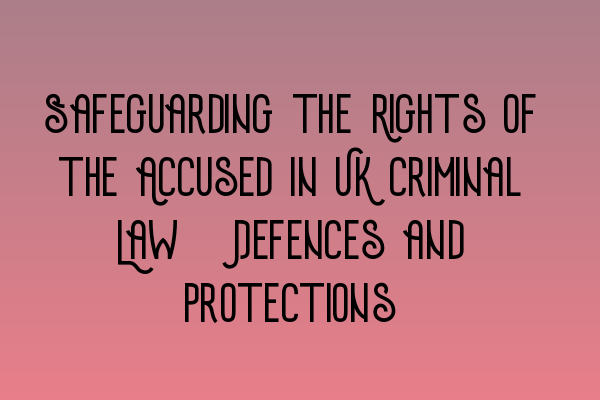Safeguarding the Rights of the Accused in UK Criminal Law: Defences and Protections
Welcome to the SQE Criminal Law & Practice Law UK blog. In this article, we will explore the crucial topic of safeguarding the rights of the accused in UK criminal law. When facing a criminal charge, it is essential that individuals have access to defences and protections to ensure a fair trial and protect their rights.
Before diving into the various defences and protections available, let’s briefly discuss the importance of understanding criminal law and how it relates to the Solicitors Qualifying Examination (SQE) preparation. If you are preparing for the SQE 1 or SQE 2 exams, we recommend checking out our related articles on SQE 1 Practice Exam Questions and SQE 1 Practice Mocks FLK1 FLK2. Our SQE 2 Preparation Courses and SQE 1 Preparation Courses are designed to help you succeed in these exams. Additionally, it’s crucial to stay updated on the latest SRA SQE Exam Dates to plan your studies effectively.
Presumption of Innocence
One of the fundamental principles of UK criminal law is the presumption of innocence. This principle ensures that an accused person is considered innocent until proven guilty. It places the burden of proof on the prosecution to establish guilt beyond a reasonable doubt.
The presumption of innocence serves as a vital protection for the accused and helps to maintain the fairness and integrity of the criminal justice system.
Defences in Criminal Law
Defences play a significant role in safeguarding the rights of the accused. It allows individuals to challenge the allegations made against them and prove their innocence. Let’s discuss some common defences available in UK criminal law:
- Self-Defence: When an accused person uses reasonable force to protect themselves or others from harm, self-defence may be invoked. It is a crucial defence to consider in cases where an individual’s physical safety is at risk.
- Mistake: Mistake of fact or law may serve as a defence if the accused genuinely believed their actions to be lawful or had a misconception of the facts surrounding the alleged criminal act. However, the availability and applicability of this defence depend on the specific circumstances of the case.
- Intoxication: In certain situations, intoxication may be considered a defence if it can be proven that the accused was involuntarily intoxicated or their capacity to form criminal intent was impaired due to intoxication. However, voluntary intoxication typically cannot be used as a defence.
- Insanity: The defence of insanity involves proving that the accused person was suffering from a mental illness at the time of the alleged offence, which affected their ability to understand the nature and consequences of their actions.
- Duress/Coercion: If an individual commits a criminal act under duress or coercion, where their actions were influenced by the threat of serious harm, this defence may be applicable.
It is important to note that the availability and success of these defences depend on the specific facts and circumstances of each case. Seeking professional legal advice is crucial to determine the most appropriate defence strategy.
Procedural Protections
Alongside defences, UK criminal law provides various procedural protections to safeguard the accused’s rights. These include:
- Right to Legal Representation: Every accused person has the right to legal representation. It ensures that individuals have access to legal expertise and assistance in navigating the complexities of the criminal justice system.
- Right to Silence: Individuals have the right to remain silent during the criminal investigation and trial. This protects them from self-incrimination and ensures fairness in the proceedings.
- Rules of Evidence: The rules of evidence govern the admissibility of evidence presented in court. These rules aim to ensure that only reliable and relevant evidence is considered during the trial.
- Preliminary Hearings: Preliminary hearings, such as bail hearings, allow the accused and their legal representatives to challenge the prosecution’s case, present legal arguments, and seek appropriate remedies.
- Right to Appeal: If an accused person is convicted, they have the right to appeal the decision. This provides an opportunity to challenge the convictions or sentences imposed by higher courts.
These procedural protections, combined with defences, form a critical part of the criminal justice system, ensuring that the rights of the accused are upheld and that justice is served.
Conclusion
Safeguarding the rights of the accused is of utmost importance in UK criminal law. Defences and procedural protections serve as essential elements in ensuring a fair trial and protecting the innocent. Understanding these defences and protections is crucial for aspiring Solicitors preparing for the SQE exams.
At SQE Criminal Law & Practice Law UK, we are committed to providing comprehensive and effective preparation courses for the SQE 1 and SQE 2 exams. Check out our related articles and take advantage of our expertise to enhance your understanding of criminal law.
Remember, everyone has the right to a fair trial and access to justice.
